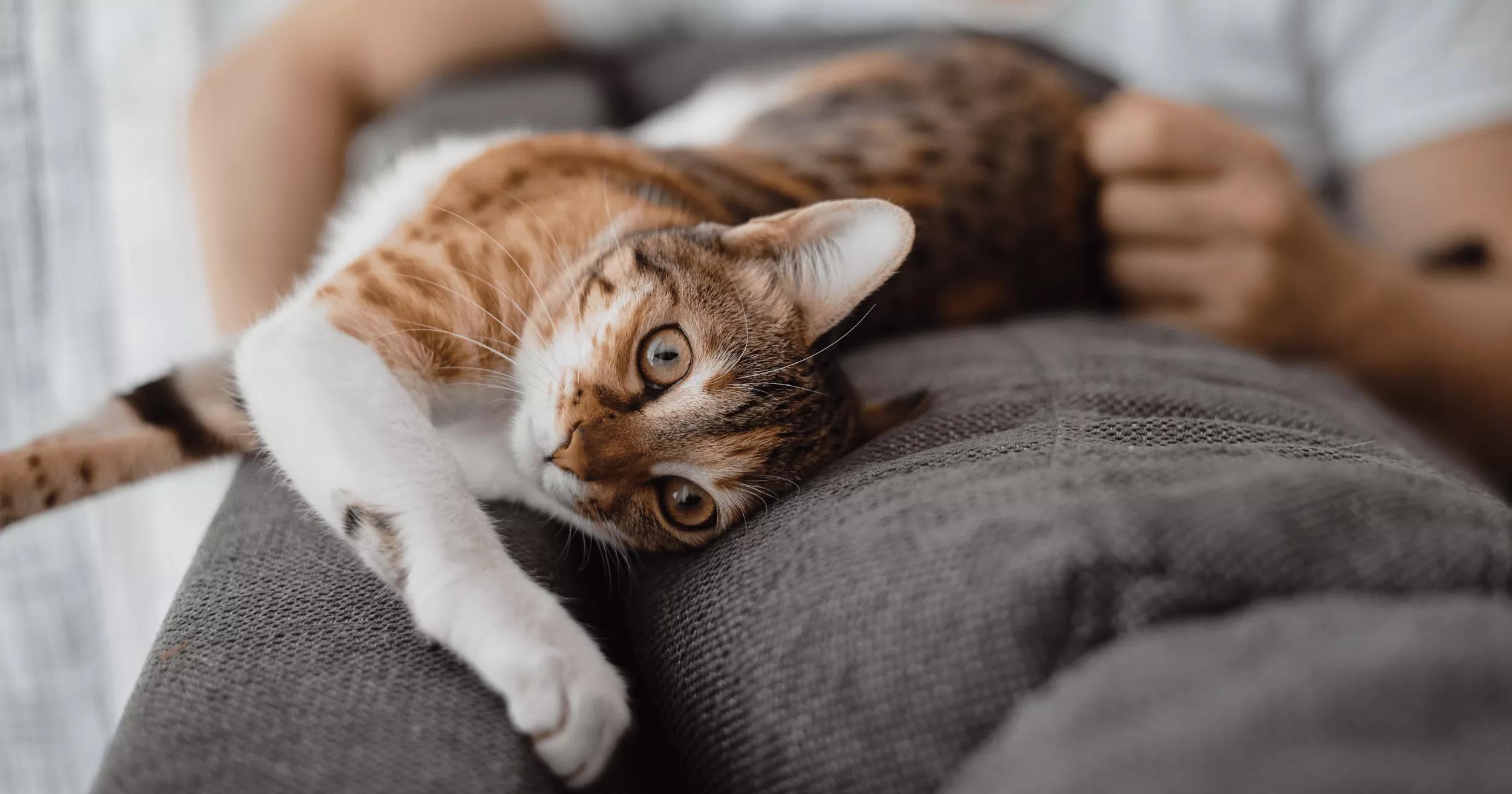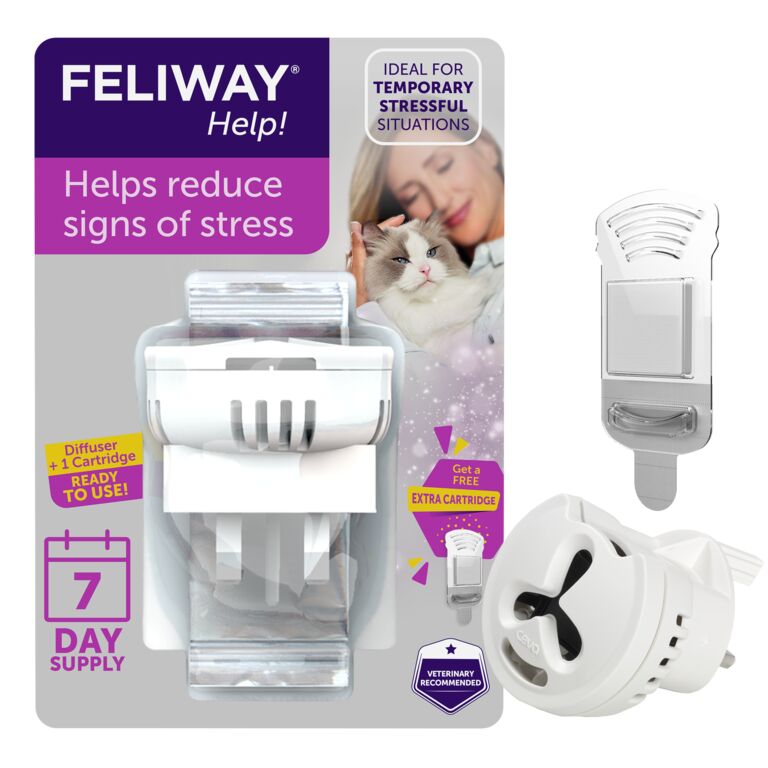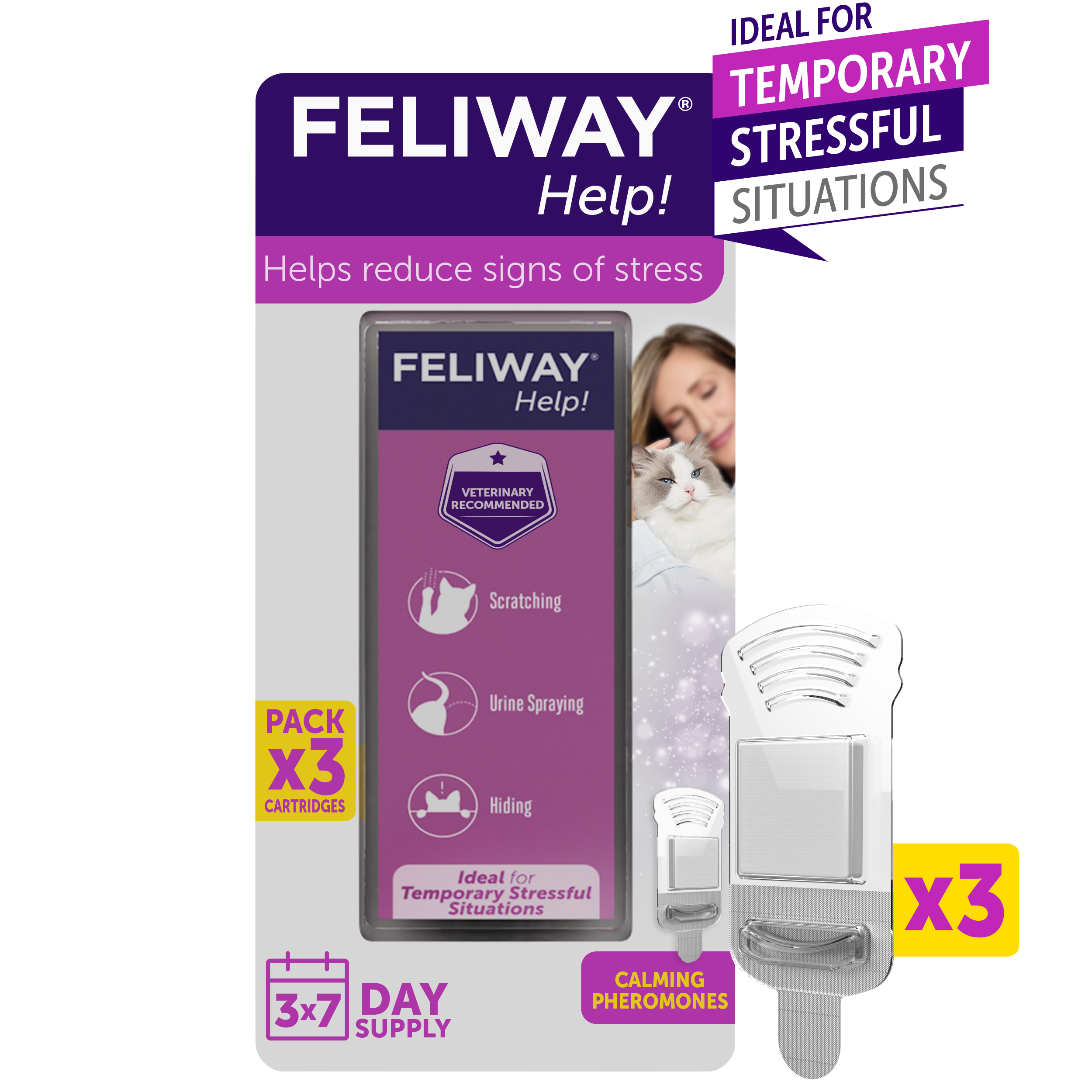
14 Ways to Comfort Your Cat in Stressful Situations
It’s not always easy to know when your cat is feeling stressed or anxious. They’re subtle animals and it can be difficult to spot signs of their emotions. But that doesn’t mean they’re not feeling those emotions – in fact, it’s the opposite! Cats can get fearful, anxious, and frustrated just as much as us humans.
So, what can we do to help our feline friends? Well, first things first, learning to understand our cat’s body language is an important step. If we can recognise the signs of cat stress, we can identify when our cats are in discomfort and support them through any difficult situations. Or better yet, avoid those stressful situations from arising altogether!
Signs that your cat may be stressed
If you’re concerned your cat is stressed or in discomfort, look out for these signs:
- Crouching and looking tense
- Being more vocal than usual
- Hissing or growling
- Becoming more withdrawn
- Hiding more frequently
- Becoming less tolerant of people
- Eating or drinking less than usual
- Overeating
- Swallowing in an exaggerated way
- Licking their nose
- Urinating or defaecating outside the litter tray
- Remaining still, particularly when they are normally more energetic
- Shaking
- Holding or swishing their tail close to their body
- Holding their whiskers back with flat ears and dilated eyes
- Hypervigilant
- Spraying urine
- Overgrooming
- Scratching in unusual places
It’s worth mentioning that your kitty doesn’t have to display all these signs of cat stress at once. Any combination of these could be an indicator your cat is unhappy or in discomfort. On the plus side, if you do think your cat is stressed, there are a number of ways we can help!

7 Ways to comfort your cat in stressful situations
The sooner you can spot that your cat is not happy, the sooner you can do something about it. Consider the situations that your cat encounters that they may find difficult to cope with. These can include:
-
Bringing another cat into the home: Introducing a second cat can be stressful, particularly if the first cat has had you and the house to themselves for a while. It’s important to make sure that each cat has their own resources. For example, they should each have their own feeding and drinking stations, beds, hiding places, scratching posts, and so on.
-
Visitors to the home. Cats take a while to get used to new things, and that includes visitors! So, to avoid any cat stress, make sure your visitors know how to act around your pet and ask them to let your kitty come to them in their own time.
-
A new addition to the family. Babies can turn your world upside down when they first arrive – and it’s no different for your cat! It’s important that you introduce your cat to your new family member gradually. You should also continue to spend quality time with them after the baby arrives.
-
Changes around the home: ,This could be anything from decorating to simply moving furniture. It’s a known fact that cats like routine and, unfortunately, the saying ‘change is as good as a rest’ does not apply to our furry friends! Plan ahead for any upheaval to your cat’s daily routine by making changes gradually. You should also aim to settle your cat into a different room if needed with all of their familiar resources so that they can avoid disruption.

-
Loud noises: Cats have super sensitive hearing. This means that any sudden or loud noises, such as fireworks, can send their senses into overdrive. When you know firework celebrations are due, take steps to protect your cat by making sure they have access to their favourite safe haven. You can also try disguising outside noise by playing music and closing all curtains and doors. Or how about using Happy Snack by FELIWAY to provide a delicious distraction? This calming cat treat is a great way for you and your feline friend to spend quality time together!
-
Travelling in the car: Cats like to roam around the house and their own territory, so being enclosed in a car can be stressful for them. Unfortunately, this situation can be unavoidable if you ever need to take them to the vet or grooming centre. The best solutions is to take steps to get them used to both their cat carrier, and the car, before you even start to travel. Another useful tip is to use Feliway Classic Spray which is designed to make these trips less stressful.
- Boredom: Is your favourite feline becoming bored? If you have an indoor cat, it’s important that there is enough stimulation around the home to keep them physically and mentally active. For example, you could introduce scratching posts and climbing places to stave off those signs of cat stress, as well as hiding places to help prevent them becoming bored. Scheduling regular playtime into their daily routine can also be highly effective.
How to Help a Cat with Stress
While the advice above is great for individual situations that can lead to cat stress, it’s fair to say we haven’t covered everything. But don’t worry, we’re not going to stop there! If you’re looking for more generalised advice for comforting your kitty, try out these tips below:
- FELIWAY Optimum: If you’re unfamiliar with FELIWAY Optimum, this pheromone diffuser can provide enhanced serenity to your cat and help comfort them in stressful situations. Simply plug the diffuser in wherever your cat spends most of their time and FELIWAY Optimum will take it from there!
- Access to hiding places: Make sure your cat can always access their favourite hiding places when they’re indoors. They also need to have escape routes, such a high shelf, so that they can remove themselves from any stressful situations.
- Respect your cat’s boundaries: If your cat is hiding, don’t force them to come out. They will do so on their own terms and when they feel more comfortable. In fact, this is true for all interactions with cats. You should never stroke or pick up a cat who doesn’t want this interaction. Instead, let yourself be guided by your cat and what they’re comfortable with.
- Keep them to a routine: We mentioned it already, but there’s no harm repeating ourselves – cats love routine! This includes keeping to regular feeding times, playtime, and bedtime.
- Exercise: Another tip to avoiding cat stress is to make sure they get plenty of exercise. This should include both physical and mental stimulation.
- Calm tones: Cats are highly receptive creatures and can pick up on our moods more than you might think. So, remain calm and talk to your cat in a low, soothing tone.
- Rewards: Last but not least, reward your cat whenever they show signs of relaxing! This positive encouragement can help your cat to feel more at ease, hopefully preventing any potentially difficult situations from getting to them.
As ever, if you think your cat isn’t coping with stressful situations, it’s strongly recommended to contact your vet. There may be an underlying medical problem that is contributing to how your cat is behaving. Your vet can also advise about a qualified behaviourist who can develop a management plan for your cat, depending on the underlying emotions your cat is experiencing.

Are you interested in learning more about how FELIWAY Optimum works, or simply want to know everything you can about caring for your cat? Then check out our other blogs. If you’re unsure whether your cat is feeling stressed, you can also take our quiz! Otherwise, stay informed with the latest tips, advice, and product info by signing up to our newsletter.





































